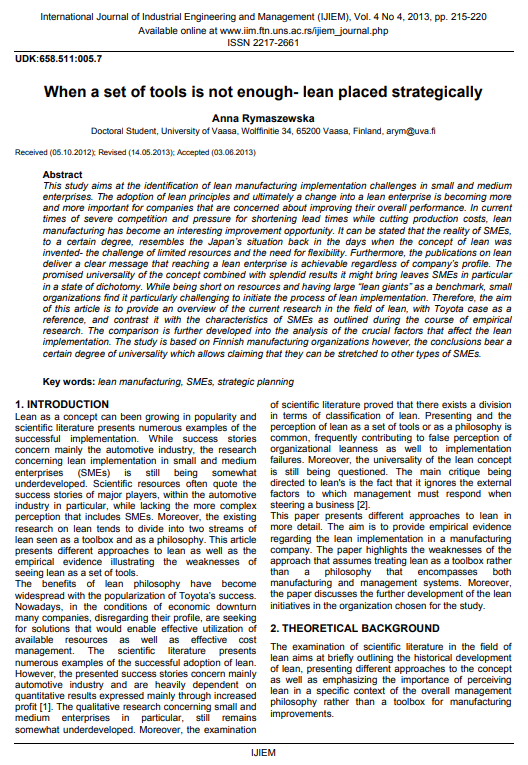
Published 2013-12-30
abstract views: 412 // FULL TEXT ARTICLE (PDF): 0
Keywords
- lean manufacturing,
- SMEs,
- strategic planning
How to Cite
Copyright (c) 2023 International Journal of Industrial Engineering and Management

This work is licensed under a Creative Commons Attribution 4.0 International License.
Abstract
This study aims at the identification of lean manufacturing implementation challenges in small and medium enterprises. The adoption of lean principles and ultimately a change into a lean enterprise is becoming more and more important for companies that are concerned about improving their overall performance. In current times of severe competition and pressure for shortening lead times while cutting production costs, lean manufacturing has become an interesting improvement opportunity. It can be stated that the reality of SMEs, to a certain degree, resembles the Japan’s situation back in the days when the concept of lean was invented- the challenge of limited resources and the need for flexibility. Furthermore, the publications on lean deliver a clear message that reaching a lean enterprise is achievable regardless of company’s profile. The promised universality of the concept combined with splendid results it might bring leaves SMEs in particular in a state of dichotomy. While being short on resources and having large “lean giants” as a benchmark, small organizations find it particularly challenging to initiate the process of lean implementation. Therefore, the aim of this article is to provide an overview of the current research in the field of lean, with Toyota case as a reference, and contrast it with the characteristics of SMEs as outlined during the course of empirical research. The comparison is further developed into the analysis of the crucial factors that affect the lean implementation. The study is based on Finnish manufacturing organizations however, the conclusions bear a certain degree of universality which allows claiming that they can be stretched to other types of SMEs.
Article history: Received (05.10.2012); Revised (14.05.2013); Accepted (03.06.2013)

